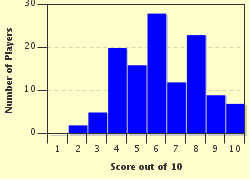Quiz Answer Key and Fun Facts
1. In which of the following countries has the consumption of oleander seeds been used as a method of suicide for centuries?
2. Which of these statements about the Scarlet Angel's Trumpet is TRUE?
3. Which part of the wisteria plant is especially toxic?
4. Rhododendrons can be so toxic that some people have been poisoned after eating honey produced by bees which fed these blooms.
5. Native to Europe, foxglove is very toxic, but is also the source of which of the following medications?
6. What is the name of this beautiful (but toxic), ornamental flower that is found in lawns across the Americas, Europe, Asia, and parts of Africa?
7. Which of the following flowers is sometimes referred to as "The Queen of All Poisons"?
8. In which of the following continents are you most likely to see water hemlock growing wild?
9. Any knowledgeable gardener will tell you never to eat the seeds of the flowering castor bean plant because they contain which deadly poison?
10. Atropa belladonna is a highly toxic plant, more commonly known by which of the following names?
Source: Author
dcpddc478
This quiz was reviewed by FunTrivia editor
WesleyCrusher before going online.
Any errors found in FunTrivia content are routinely corrected through our feedback system.


